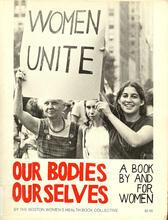Esther Rome
A co-author of Our Bodies, Ourselves, Esther Rome educated women about their health and brought awareness to the dangers of products ranging from tampons to breast implants. Rome graduated from Brandeis in 1966 and earned an MA in education from Harvard in 1968. In 1969 she helped found the Boston Women’s Health Book Collective and began working with the group on Our Bodies, Ourselves, a vital women’s health resource. She campaigned for industry reform and helped institute mandatory warning labels and instructions for use on every box of tampons. In 1988 she began working to raise awareness about the dangers of breast implants and creating support groups. When she passed away in 1995, she was co-editing Sacrificing Our Selves for Love with Jane Wegscheider Hyman, which was then published in 1996.
A coauthor of Our Bodies, Ourselves, a classic women’s resource book, Esther Rome came of age with the onset of the modern feminist movement and was a leader in shaping modern American notions of self-help and advocacy for women’s physical and mental health.
Family and Education
Esther Rachel (Seidman) Rome was born in Norwich, Connecticut, on September 8, 1945, the youngest child of Leo and Rose (Deutsch) Seidman. Her parents operated a five-and-ten-cent store in Plainfield, Connecticut, a small textile mill town where Esther grew up. She had two brothers, Aaron and Abe Seidman, and a sister, Sara Levine. She graduated from Brandeis University in 1966 and earned a M.A. from Harvard University’s Graduate School of Education in 1968. She was married to Nathan Rome in 1967 and had two sons, Judah and Micah, in respectively 1977 and 1982.
Women’s Health Writing and Contributions
Rome and the women who founded the Boston Women’s Health Book Collective began to meet in 1969, following one of the first women’s liberation conferences, held in Boston. Their book Our Bodies, Ourselves evolved from a collection of articles distributed on newsprint, starting in 1970, to progressively expanded and updated versions. By 1996, Our Bodies, Ourselves was over seven hundred pages and sold nearly four million copies in over fifteen languages. It is considered an indispensable reference work by several generations of women around the world.
Rome was a member and served on the staff of the Boston Women’s Health Book Collective for over twenty-five years. She was also a board member of the collective. Rome’s perspective, that women’s health difficulties require broad solutions that include social, economic, and political responses as well as medical ones, was reflected in the work of the collective. All of their written work juxtaposed first-person narratives of women’s experiences with medical information garnered from published research.
The collective’s approach was reflected in Rome’s grounded outlook on all facets of her life and work. Her major contributions focused on sexuality, menstruation, food and nutrition, and the beauty industry.
Her menstruation brochure, printed in red ink, was one of the collective’s first spin-off publishing projects. It grew into a related long-term project when toxic shock syndrome, a strep infection that causes serious illness and in some cases death, was first identified in the 1970s. When it became apparent that the disease was most prevalent among young women who used high-absorbency tampons, Rome began a campaign to institute uniform labeling on tampon packages. During a long stint on the American Society for Testing and Materials’ Tampon Task Force, Rome held her ground against persistent opposition from tampon manufacturers. Today tampon boxes include a warning—much like that on cigarettes—and contain a flyer describing possible risks and how to use the product safely.
Legacy and Fighting Dangerous Products
One of Rome’s last projects was to assure appropriate regulation of silicone-gel breast implants by the United States Food and Drug Administration. Between 1988 and the end of her life, she was involved in every facet of the struggle to assure sound research on the long-term safety of these devices. Her greatest contributions were an astute understanding of the science related to the use of silicone in the body and the communication of that information in commonsense language. Rome formed and ran a support group of women with breast implants in the Boston area, provided information to print and television reporters so that consumers would be educated on the issues, and placed the struggle in a larger context of the social pressure on women to alter their physical appearance.
At the time of her death, Rome was completing the editing of a book, Sacrificing Our Selves for Love, coauthored with Jane Wegscheider Hyman (1996), that analyzes significant women’s health issues, including cosmetic surgery, dieting, domestic violence, and HIV infection, that relate to women’s desire to accommodate partners in intimate relationships.
Rome’s own domestic life illustrated the grace with which she blended domestic and advocacy careers. A devoted mother, she reserved Friday nights to be with her family to celebrate the Sabbath. She helped to keep a Term used for ritually untainted food according to the laws of Kashrut (Jewish dietary laws).kosherhome and was an active member of Temple B’nai Brith in Somerville, Massachusetts, where she lived with her family.
Rome lived her life as she would have wished for all women—with the power of decision over its structure and its details. She loved to seek and absorb information, to digest it thoughtfully, and to share it broadly. Although she embraced visibility when it advanced her cause, she did not seek the limelight, but always shared the work and its rewards. Esther Rome died of breast cancer on June 24, 1995.
Boston Women’s Health Book Collective. The New Our Bodies, Ourselves (1992).
“Esther Rome, Author, Dies at 49.
Sought Better Health for Women.” NYTimes, June 27, 1995, D21.
Hyman, Jane Wegscheider, and Esther Rome. Sacrificing Our Selves for Love (1996).
Rome, Nathan [husband]. Personal communication with author, January 1997.
Sanford, Wendy. “In Memoriam: Esther Rome.” A Gala Celebration—Our Bodies, Ourselves (March 8, 1996): 24–26.
Zones, Jane. “Esther Rome: 1945–1995.” Network News (September/October 1995): 8.



